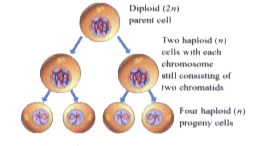Describe the terms evaporation and condensation. Name the process in which both the processes are used.
Step-by-Step Text Solution:
1. Definition of Evaporation:
- Evaporation is the process in which a liquid changes into its vapor form at a temperature that is lower than its boiling point. This process occurs on the surface of the liquid and can happen at any temperature.
2. Definition of Condensation:
- Condensation is the process by which vapor (gas) changes back into a liquid. This occurs when the vapor cools down and loses energy, allowing the molecules to come together and form a liquid.
3. Processes Involving Both Evaporation and Condensation:
- Both evaporation and condensation are used in the process of distillation. Distillation is a method of separating components of a liquid mixture based on differences in their boiling points. During distillation, the liquid is first evaporated (heated to its boiling point) and then the vapor is cooled down to condense it back into a liquid.
- Evaporation is the process in which a liquid changes into its vapor form at a temperature that is lower than its boiling point. This process occurs on the surface of the liquid and can happen at any temperature.
- Condensation is the process by which vapor (gas) changes back into a liquid. This occurs when the vapor cools down and loses energy, allowing the molecules to come together and form a liquid.
- Both evaporation and condensation are used in the process of distillation. Distillation is a method of separating components of a liquid mixture based on differences in their boiling points. During distillation, the liquid is first evaporated (heated to its boiling point) and then the vapor is cooled down to condense it back into a liquid.
Similar Questions
Knowledge Check
Condensation is a process which occurs when
(a) temperature falls below 0∘C
(b) absolute humidity becomes equal to relative humidity
(c) temperature in the air parcel remains static
(d) relative humidity becomes 100% and moreAtemperature falls below 0∘CBabsolute humidity becomes equal to relative humidityCtemperature in the air parcel remains staticDrelative humidity becomes 100% and moreThe process of evaporation causes
AheatingBcoolingCtemperature to riseDnone of theseThe joint process of vapourisation and condensation is called:
ASublimationBChromatographyCDistillationDCrystallisation
Describe the process of Fertilization and Imptantation
View SolutionIs evaporation of water an exothermic process ?
View SolutionDescribe the process of digestion in man.
View SolutionDescribe the process of formation of petroleum
View SolutionThe joint process of vapourisation and condensation is called:
View Solution

